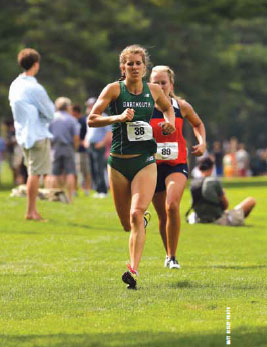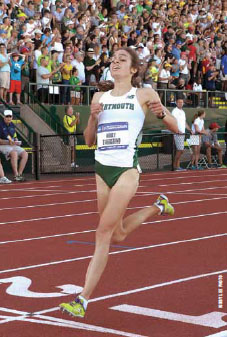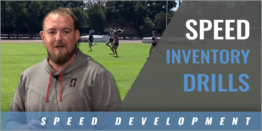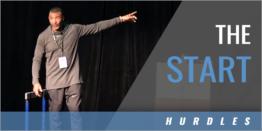|
Mental Toughness - The Psychological Skills By: Mark Coogan Originally Published in Techniques Magazine - Official Publication of the USTFCCCA
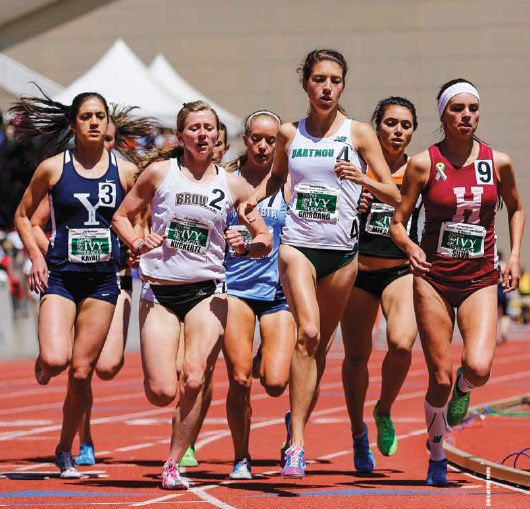
Purpose Definition of Mental Toughness Review of Research Literature The proper mindset, i.e., having the right mental attitude, is needed to excel at any sport. All top-level athletes have a mental toughness in them. According to Jones, Hanton and Connaughton (2007) there are four attributes that make up the belief system of mentally tough performers. The four beliefs are: (1) Having an unshakable self-belief to achieve goals; (2) Having an inner arrogance; (3) Having a belief that you can get over any obstacle; (4) Having a belief that your desire will ultimately result in fulfilling your potential. Unshakable Self-Belief When I lived in Boulder, Colo., and was training for the Olympic Games, I would come in contact with elite track and field coaches from across the globe. I remember one particular conversation with a South African Olympic coach named Bobby McGee about underperforming in races. The conversation drifted to how beliefs and expectations influence performance. We agreed that most people under-perform in races because of not having that needed unshakable belief in performance. Recently, I came across an article in a marathon journal that quoted McGee on the way runners perform. McGee again emphasized that most people under-perform in races and that he believes only 9 percent of athletes perform up to their potential. These under performing runners haven't completed the mental component of race training; they don't believe they will perform well. McGee feels they are fearful of being too uncomfortable during the race and they're fearful of falling short of their race goal. As a result, they psych themselves out of a good performance. "There's a weight of expectation. People become attached to a certain outcome in a race. They run with a brick in their back pocket and end up putting too much stress on themselves. It's like carrying around a piece of that wall with you, instead of leaving it "crumbled on the side of the road" (Farb, S., 2008). Over the course of McGee's coaching career, he has seen a mental trend: People who have been ill or injured and miss training might get to a race maybe 85 to 90 percent prepared to perform up to their potential. They don't expect to do well. McGee says that in most cases they do exceptionally well. Then they go away, train hard, have expectations for the next race, and don't do well. McGee states it's the weight of expectation without complementary training for the brain that undermines many athletes along the way (Farb, S., 2008). These runners lack the self-belief to be elite. I witness the same phenomenon in my collegiate coaching. Athletes can have the physical talent to perform well, to be an All-American, but they lack the unshakable belief that it takes to be a champion. Belief That Desire Will Ultimately Result in Fulfilled Potential Goal Setting The motivation of athletes to perform to their potential or to sustain maximum effort in order to complete a task successfully has always been a source of frustration for coaches. Motivation comes from within the individual and cannot be observed directly. Since coaches will not be able to alter the athletes' personality structures, a coach must use certain motivational strategies to encourage improvement and aid his or her athletes in reaching their optimum performance levels. Goal setting an optimal motivational technique that can enhance an optimal motivational technique that can enhance performance. According to Dension and Winslade (2006), goal setting as a motivational tool that allows the athlete to appreciate that achievement is a do-it-yourself process, that motivation is an event that transpires within the individual rather than in interaction with others; and that goal setting is the greatest motivational tool available to them. Goals tend to increase individual task performance by raising the individual's self efficacy, i.e., the belief that they can perform a certain task. Individuals with higher self efficacy set higher personal goals. Imagery According to Cumming and Hall (2002), mental imagery should be treated similarly to physical practice given that research has suggested a functional equivalence between the two activities. Certain parts of the brain show a pattern of activity during imagery similar to that during performance. Cumming and Hall also state that there is evidence that respiratory indices such as heart rate, which anticipate muscular activity, are also increased during imagery. They found that a significant and positive relationship existed between the dimensions of relevance and concentration. The higher the level of success by an athlete the more use of imagery that takes place. A national class athlete will spend more time each week on mental imagery than a recreational athlete. A coach could explain the importance of imagery to less skilled athletes. Elite athletes tend to find imagery highly relevant to improving their performance, requiring a great deal of concentration and being enjoyable to perform. Imagery can lead to a more positive interpretation of an upcoming athletic situation. If an athlete is in a positive emotional state then they should perform better and have more positive outcomes. An example given by Jones (2003) is about a climber. After using imagery the climber, rather than feeling anxious prior to a difficult ascent, experiences excitement in that he now believes that he has the skill to climb well and he will indeed climb well. An example in running would be using imagery to run through a race in your head. When you go through your strategy a few times then there is a greater chance you will stick to your race plan once the going gets tough. Mentally tough athletes believe imagery is highly relevant for improving performance. Patrick and Hrycaiko (1998) stated that relaxation involved learning a three-step approach. The first step required the participants to practice progressive muscle relaxation training. The second focused on centering while stretching before competition. The final step consisted of practicing techniques related to relaxing during competition. The participants monitored their tension levels before and after relaxation sessions (Patrick and Hrycaiko, 1998). Participants were at more of an optimal level to compete when they had learned the relaxation techniques. Self-Talk If a runner is doing intervals and getting tired, a good coach may ask the athlete what they are thinking on the rest period between intervals. If he or she gets a negative response from the athlete then coach will know that negative self-talk is occurring and that the athlete needs to learn positive self-talk to enhance confidence. Thelwell and Greenlees (2003) explained that using motivational self-talk helped endurance athletes maintain and increase their drive to do well. It helped them get psyched up and relaxed for a good performance. When an athlete had mastered self-talk there were high levels of focus, self-confidence and an ability to cope in difficult situations. They could focus on task-relevant factors not task-irrelevant factors. Positive self-talk will be found in all mentally tough athletes. Section III-Summary and Conclusion References Bio
|



